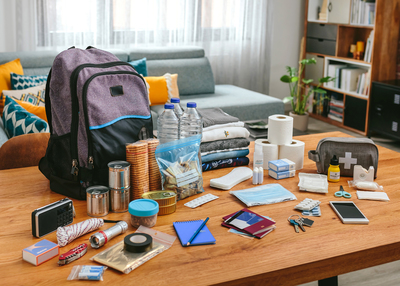Older adults can plan for disasters with easy steps

Writer: Ms. Susan M. Collins-Smith, MSU Extension Service
RAYMOND, Miss. -- As hurricane season begins, older adults should be sure their disaster plan is up to date and reflects their current situation.
David Buys, health specialist with the Mississippi State University Extension Service, said everyone needs to review their disaster plan periodically, but older adults will want to make sure their plan reflects any new specific needs or special circumstances they may have.
He recommends following the guidelines in the Federal Emergency Management Agency’s “Disaster Preparedness Guide for Older Adults” when reviewing or creating a plan.
“Some things to consider when thinking about your disaster plan are whether you have any special medical needs, dietary needs, mobility challenges or a disability that need to be taken into account,” Buys said. “Do those needs or circumstances require medications, devices or assistance that would be affected in a disaster?
“If you have a pet or a service animal, you’ll need to have a plan for them as well. Make sure you have a plan for communicating with family, friends or neighbors, especially if you live a long distance from family or friends.”
This assessment is the first step of a three-step process to build an adequate disaster plan. During step one, Buys suggests people think about their day-to-day routines and how a disaster could affect that routine.
The second step involves creating a plan and building an emergency kit. Make sure family, friends and neighbors know the emergency plan, know about medications and understand how to use necessary medical equipment. Have a backup plan for any routine medical treatments through home health services or medical facilities. Check with shelters or the local emergency management personnel about arrangements for pets or service animals if it is necessary to evacuate.
In addition to basic emergency kit supplies, include items specific to individual needs, including a list of the support network and their contact information, extra hearing aids and other assistive devices and supplies for service animals.
“For individuals with limited resources, look for free or discounted items to include in your emergency kit, and check with your emergency management agency to find out what services are available during a disaster,” Buys said. “It is also critical to keep insurance and financial records in a waterproof container that can be picked up and taken with you if you need to evacuate.”
Rural residents should stock up on essential items that may be hard to get in a disaster and have a reliable way to communicate with their support network. A backup power source is also important, Buys said.
The last step is to involve the members of the support network by making them aware of the plan and having them practice the plan.
Anne Hilbun-Benoit, instructor with the MSU Extension Center for Government and Community Development, said in addition to the local emergency management office, community centers, senior centers or assisted living facilities may be able to offer information and support.
“Local television and radio stations are a great source of information before, during and after a disaster,” said Hilbun-Benoit. “Just make sure you have a backup power source in case the power goes out. Available support resources will vary depending on where a person lives. If you are unsure what resources are available, start by contacting your local government officials -- your city alderperson, county supervisor or county emergency manager.”
She also suggests people be on alert for scams, especially after a disaster.
“If there is storm damage that needs to be cleaned up or repaired, it is best to make sure you are working with someone local and ensure that you research them before you agree to anything. Your insurance agent is a great resource to help with selecting a contractor,” Hilbun-Benoit said. “This reduces the risk that you will be the victim of a scam. But it’s not a guarantee.”
She recommends heeding the following tips when hiring any contractor for repair work:
- Do not rush repairs.
- Get two to three bids and check all references.
- Be cautious of door-to-door offers of repair service.
- Ask for proof of contractor’s license number or registration.
- Get a written contract detailing the repair work with a detailed plan to get it done.
- Never pay in cash.
- Do not make large down payments.
- Do not make the final payment until the job is complete.
For more information about hiring a contractor and other consumer information, visit the Mississippi State Board of Contractors website at https://www.msboc.us/consumers/hire-a-contractor/. The MSBOC also offers a Scam Stopper Seminar. For more information, visit https://www.msboc.us/consumer-outreach/.
The “Disaster Preparedness Guide for Older Adults” can be found on the Federal Emergency Management Agency’s website at https://www.ready.gov/older-adults.
For more detailed information about disaster planning, visit the Mississippi Emergency Management Agency’s website at https://www.msema.org/.